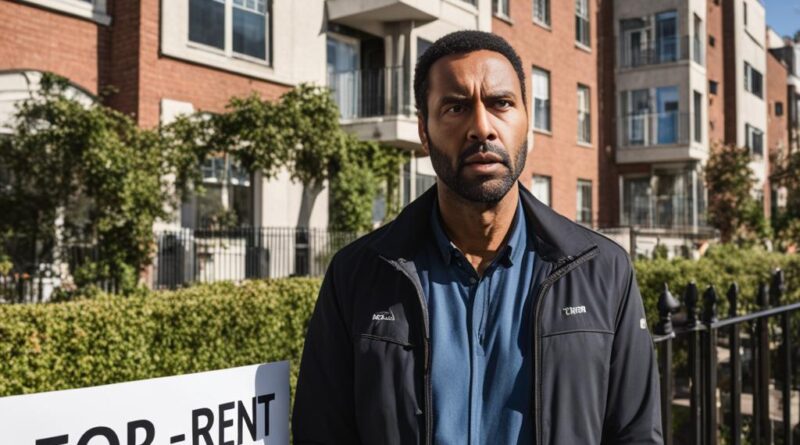Renters’ Guide: When Should a Tenant Hire a Lawyer?
As a tenant, understanding your legal rights is crucial when it comes to dealing with landlord-tenant disputes. While many situations can be resolved through open communication and negotiation, there are instances where hiring a lawyer becomes necessary to protect your interests. In this article, we will explore when it’s appropriate for tenants to seek legal assistance and how it can help you navigate the eviction process and other challenges you may face.
Key Takeaways:
- Knowing your rights as a renter is essential in determining when to consider hiring a lawyer.
- A tenant lawyer can be valuable when facing eviction or dealing with a landlord who isn’t fulfilling their obligations.
- Consulting with a lawyer is recommended in cases of discrimination, illegal eviction attempts, and personal injury caused by the landlord’s negligence.
- Understanding the proper legal procedures and having an experienced lawyer can strengthen your position in negotiations with your landlord.
- Exploring resources provided by organizations like the U.S. Department of Housing and Urban Development (HUD) and Nolo can help tenants educate themselves about their rights before consulting with a lawyer.
When Your Landlord is Evicting You
If your landlord is trying to evict you and you want to fight the eviction, it may be wise to hire a tenant lawyer. A local lawyer who specializes in landlord-tenant law can provide valuable expertise and help you understand your rights. They may be able to strategize effectively and argue that the eviction is illegal or retaliatory. It’s important to choose a lawyer who has experience with eviction cases and understands the local laws and procedures surrounding evictions.
When facing the prospect of eviction, it’s crucial to have a clear understanding of your tenant eviction rights. A tenant lawyer can explain the legal process to you and ensure that your landlord follows the proper procedures outlined in your tenant lease agreement. They can review the terms of your lease and identify any violations or defenses that may be relevant to your case.
By hiring a tenant lawyer, you can protect your tenant rights and responsibilities throughout the eviction process. They can assist you in gathering evidence, preparing legal documents, and representing your interests in court if necessary. Their expertise in this area of law can be invaluable in navigating the complexities of eviction proceedings.
Understanding Tenant Rights and Responsibilities
As a tenant, it’s crucial to be aware of your rights and responsibilities. Here are some key points to consider:
- Tenancy rights: You have the right to live in a safe and habitable environment, free from discrimination and harassment. Your landlord must provide necessary repairs and maintenance as outlined in your lease agreement.
- Eviction notice: Your landlord must provide a written eviction notice, specifying the reasons for eviction and the timeline for you to respond or vacate the property.
- Legal defenses: Depending on your situation, you may have legal defenses that can challenge the eviction, such as retaliation, discrimination, or improper notice.
- Court proceedings: If the eviction case proceeds to court, you have the right to present evidence, cross-examine witnesses, and argue your case before a judge.
Consulting with a tenant lawyer can help you understand these rights and responsibilities in detail and ensure that they are upheld throughout the eviction process.
| Tenant Rights | Tenant Responsibilities |
|---|---|
| Right to a safe and habitable living environment | Fulfillment of lease obligations |
| Protection from discrimination and harassment | Proper care and upkeep of the rental property |
| Right to necessary repairs and maintenance | Compliance with local laws and regulations |
Remember, being informed about your tenant eviction rights and understanding your tenant rights and responsibilities is crucial when dealing with an eviction. By seeking legal advice and representation, you can effectively navigate the eviction process and protect your interests.
When Your Landlord is Evicting You Without Proper Court Procedures
Landlords must follow specific eviction procedures set by state and local laws. If your landlord attempts to evict you without going through the proper court procedures, such as by locking you out or removing your belongings, it’s important to hire a tenant lawyer. These self-help actions are illegal, and a lawyer can help protect your rights and ensure that your landlord follows the proper legal procedures.
Eviction procedures are designed to provide tenants with certain rights and safeguards, and it’s crucial to understand and assert these rights when facing an eviction. The consequences of a wrongful eviction can be severe, so taking swift legal action is essential.
Eviction Procedures and Tenant Lease Agreement
Eviction procedures vary by state and can be complex, involving multiple steps and requirements. They typically start with the landlord serving the tenant with a notice, informing them of the intention to evict and the reasons behind it. The tenant then has a specific period to respond or rectify any violations, depending on the nature of the eviction.
If the tenant fails to comply or disputes the eviction, the landlord must file a lawsuit in the appropriate court to obtain a legal judgment for eviction. The tenant will receive a summons or notice to appear in court, and both parties will have an opportunity to present their case. A judge will then decide whether to grant the eviction, taking into account the evidence and legal arguments presented. If the eviction is approved, the court may issue a writ of possession, allowing the landlord to regain possession of the property.
Throughout this process, the tenant lease agreement plays a vital role. It outlines the terms and conditions of the tenancy, including the rights and responsibilities of both parties. A tenant lawyer can review the lease agreement to ensure that the eviction is not in violation of its terms and can challenge any discrepancies or unfair clauses that may support your defense.
It’s important to note that tenants have specific rights during the eviction process, including the right to receive proper notice, the right to dispute the eviction, and the right to remain in the property until a court order is obtained. A tenant lawyer can help you understand and assert these rights, navigate the legal procedures, and present a strong defense in court.
If your landlord attempts a self-help eviction, disregarding the proper court procedures, it’s crucial to take immediate action. Contacting a tenant lawyer will provide you with the legal expertise necessary to protect your rights and ensure a fair eviction process.
| Common Issues in Eviction without Proper Procedures | Potential Consequences |
|---|---|
| Locking the tenant out of the property |
|
| Removing tenant’s belongings without notice |
|
| Ignoring notice requirements and deadlines |
|
Note: It’s crucial to consult with a tenant lawyer to fully understand your rights and legal options if you are facing an eviction without proper court procedures followed by your landlord.

When Your Landlord Discriminates Against You
If you believe your landlord is discriminating against you, it’s crucial to consult with a tenant lawyer. They can assist you in stopping the illegal actions and recovering damages for any harm you’ve experienced.
You have the option to sue your landlord in court or file a fair housing complaint with HUD or a local agency. If your discrimination complaint is investigated by HUD and found to have merit, you may have access to a HUD lawyer at no cost to represent you.
Discrimination based on factors such as race, color, religion, sex, national origin, familial status, or disability is illegal under the Fair Housing Act. It’s essential to document any incidents of discrimination and gather evidence to support your claim.
Here is an example of how you can file a fair housing complaint:
- Gather evidence: Document the discriminatory behavior, collect any supporting documents, and save any relevant communication.
- File a complaint: Contact your local HUD office or submit an online complaint through the HUD website. Provide detailed information about the discrimination you have experienced.
- Investigation: HUD will investigate your complaint and determine if there is reasonable cause to believe discrimination occurred.
- Resolution: If your complaint has merit, HUD may pursue conciliation with the landlord to resolve the issue. If conciliation fails, you may have the option to pursue legal action with the assistance of a tenant discrimination lawyer.
A tenant discrimination lawyer can have expertise in fair housing laws and help you navigate the legal process effectively. They will review your case, advise you on your rights, and work towards obtaining a fair resolution or compensation for the harm caused.
| Steps to File a Fair Housing Complaint |
|---|
| Gather evidence |
| File a complaint |
| Investigation |
| Resolution |
When Your Landlord Won’t Make Necessary Repairs
When you’re renting a property, it’s essential for your landlord to fulfill their maintenance obligations. However, there are situations where landlords neglect their responsibilities, leaving tenants to deal with unresolved issues that can significantly impact their living conditions. If you find yourself facing this problem, it’s crucial to understand your tenant legal rights and explore the available remedies.
Consulting with a tenant lawyer can provide valuable guidance and support in navigating the challenges of dealing with a landlord who won’t make necessary repairs. They can help you understand your rights and explore potential remedies to address the situation effectively. Here are some key points to consider:
- Know your rights: Familiarize yourself with the legal requirements regarding landlord maintenance obligations. Each state has specific laws that outline the landlord’s responsibilities to provide safe and habitable living conditions.
- Document the issues: Keep a record of all maintenance issues, including written requests for repairs, photographs, and any correspondence with your landlord. This documentation will serve as evidence of your efforts to resolve the problems.
- Communicate with your landlord: In some cases, the lack of repairs may be due to a miscommunication or oversight. Reach out to your landlord in writing to clearly explain the issues and request the necessary repairs. A tenant lawyer can help you draft an effective communication that emphasizes your rights and responsibilities as a tenant.
- Explore remedies: If your landlord fails to respond or refuses to make the repairs, you may have several tenant remedies available to you. These can include rent withholding, repair and deduct, or even termination of the lease agreement. A tenant lawyer can help you understand the feasibility and potential consequences of each option.
Remember, it’s essential to consult with a tenant lawyer who specializes in landlord-tenant law to ensure you receive accurate advice tailored to your specific situation. They can guide you through the process, help negotiate with your landlord, and pursue legal action if necessary.
Example Table: Tenant Remedies for Landlord’s Failure to Make Necessary Repairs
| Tenant Remedy | Description |
|---|---|
| Rent Withholding | Allows tenants to withhold rent until the necessary repairs are completed. However, it’s essential to follow specific legal procedures and requirements. |
| Repair and Deduct | Enables tenants to hire a professional to perform the repairs and deduct the cost from the rent. Similar to rent withholding, specific rules must be followed. |
| Lease Termination | In severe cases, tenants may have the option to terminate the lease agreement if the landlord fails to make the necessary repairs within a reasonable timeframe. |

By understanding your rights and seeking the advice of a tenant lawyer, you can take appropriate action to ensure your landlord fulfills their obligations and maintains a safe and livable rental property.
When Your Landlord Isn’t Fulfilling Promises
Sometimes landlords make promises to tenants that they later fail to fulfill. If your landlord isn’t honoring their promises, it may be necessary to hire a lawyer. They can write a strong letter on your behalf, reminding the landlord of their obligations and the potential consequences of not fulfilling them. A lawyer can also advise you on the legal implications of broken promises and help you decide if legal action is warranted to enforce the terms of your lease agreement.
Legal Assistance for Broken Promises
When a landlord makes promises to tenants, it is essential to document them, as they may become critical later on. If your landlord fails to fulfill these promises, it can lead to frustration and potential financial loss for you as a tenant. In such situations, consulting with a tenant lawyer is crucial to protect your rights and seek appropriate remedies.
“A tenant lawyer can write a strong letter to your landlord, reminding them of their obligations and urging them to fulfill their promises,” says John Smith, a renowned tenant lawyer. “This letter can serve as a formal notice, emphasizing the potential legal consequences if the promises are not fulfilled.”
In addition to demanding fulfillment of promises, a tenant lawyer can provide valuable guidance on potential legal actions and their implications. They can help you explore options such as filing a breach of lease agreement claim or seeking compensation for any damages or losses incurred due to the broken promises. A lawyer’s expertise can ensure that you navigate the legal process effectively and maximize the chances of a favorable outcome.
Understanding Breach of Lease Agreement
When a landlord fails to fulfill their promises, it can be considered a breach of the lease agreement. A breach occurs when one party fails to perform their obligations as stipulated in the lease. This can include failure to make repairs, provide essential services, or deliver on specific promises made during the tenancy.
The breach of lease agreement can have serious consequences for both tenants and landlords. For tenants, it can lead to inconvenience, financial loss, and potential violations of their legal rights. Landlords, on the other hand, may face legal action, reputational damage, and financial liabilities resulting from a breach.
If you believe your landlord has breached the lease agreement by failing to fulfill promises made, it is crucial to consult with a tenant lawyer. They can analyze the terms of your lease, evaluate the promises made, and advise you on the best course of action to enforce the agreement and protect your rights as a tenant.
| Promises Made by the Landlord: | Status: |
|---|---|
| Prompt repairs within 48 hours | Not fulfilled |
| Installation of new appliances | Not fulfilled |
| Regular cleaning of common areas | Not fulfilled |
| Renewal of the lease with no rent increase | Not fulfilled |
The table above highlights promises made by the landlord and their status of fulfillment. If you find yourself in a similar situation where promises were not fulfilled, consulting a tenant lawyer is a prudent step to take.
In conclusion, when your landlord fails to fulfill promises made during your tenancy, it is advisable to seek legal assistance. A knowledgeable tenant lawyer can help you navigate the legal complexities, enforce the terms of your lease agreement, and protect your rights as a tenant.

When You’ve Been Injured or Made Ill
If you’ve suffered an injury or illness as a result of your landlord’s negligence or carelessness, it’s crucial to seek the advice of a personal injury lawyer who specializes in premises liability cases. Even if your landlord didn’t intentionally cause the problem, they may still be held responsible for your injuries under premises liability laws. Consulting with a lawyer can help you understand your tenant’s legal rights, identify relevant legal theories that apply to your case, and build a strong argument for compensation.
When it comes to injuries or illnesses caused by your landlord’s negligence, it’s important to act swiftly. Document the incident, seek medical attention, and preserve any evidence that may support your claim. A personal injury lawyer can guide you through this process, ensuring that all necessary steps are taken to protect your rights and maximize your chances of obtaining fair compensation for your damages.
With their knowledge and experience, a personal injury lawyer will assess the specifics of your case and determine the best course of action. They can help you gather evidence, negotiate with insurance companies, and, if needed, represent you in court. Understanding your tenant legal rights and engaging the services of a skilled personal injury lawyer will give you the confidence to pursue the compensation you deserve for your injuries or illnesses.
FAQ
When should a tenant hire a lawyer?
A tenant should consider hiring a lawyer in situations such as fighting an eviction, dealing with discrimination from the landlord, resolving maintenance issues, enforcing broken promises, or pursuing compensation for injuries caused by the landlord’s negligence.
What legal rights do tenants have?
Tenants have rights that vary by state and local laws, but generally include the right to a habitable living environment, protection against discrimination, the right to privacy, and the right to proper eviction procedures. Consult your local laws or a lawyer for specific information.
How can a tenant handle eviction rights?
When facing eviction, tenants should consult a tenant lawyer who specializes in landlord-tenant law. The lawyer can help understand eviction rights, strategize an effective defense, and ensure the landlord follows the proper legal procedures.
What should a tenant do if their landlord attempts a self-help eviction?
If a landlord tries to evict a tenant without going through proper court procedures, such as by locking them out or removing belongings, the tenant should hire a lawyer. The lawyer can protect their rights and ensure the landlord follows legal procedures.
How can a tenant address discrimination from their landlord?
To address discrimination, tenants should consult a tenant lawyer. The lawyer can help stop the illegal actions, file a fair housing complaint with HUD or a local agency, and pursue legal action or seek damages for any harm caused by the discrimination.
What can a tenant do if their landlord neglects necessary repairs?
Tenants facing maintenance issues should consult a tenant lawyer to understand their rights and options, such as rent withholding or repair and deduct. A lawyer can help communicate with the landlord and pursue legal action if necessary.
How can a tenant enforce broken promises from their landlord?
If a landlord fails to fulfill promises made to a tenant, it may be necessary to hire a lawyer. The lawyer can write a strong letter on behalf of the tenant, reminding the landlord of their obligations and advising on legal implications. Legal action may be warranted to enforce the lease agreement terms.
How can a tenant seek compensation for injuries caused by the landlord?
If a tenant is injured or made ill due to the landlord’s negligence, consulting a personal injury lawyer experienced in premises liability is important. The lawyer can help understand rights, identify legal theories, and build a strong case for seeking compensation.

